Book of Prayers
Select Format
Select Condition 
Book Overview
Throughout his adult life, in religious communities he founded and led, Mahatma Gandhi officiated at group prayer services twice each day. For this purpose, over a period of four decades, he compiled... This description may be from another edition of this product.
Format:Paperback
Language:English
ISBN:1893163024
ISBN13:9781893163027
Release Date:January 1999
Publisher:Berkeley Hills Books
Length:157 Pages
Weight:0.48 lbs.
Dimensions:0.5" x 5.3" x 8.4"
Customer Reviews
2 ratings
Beautiful
Published by Thriftbooks.com User , 22 years ago
I have good memories attached to this book. One of the most recent times I saw Arun Gandhi was at a speaking engagement in Bend, Oregon. This event was held in the auditorium of Bend High School, in October of 2000. Because the event organizer and I are friends, I ended up doing work behind-the-scenes of the event. My main job was to "man" the table of books Arun had brought with him to raise funds for his foundation, the "M. K. Gandhi Institute for Nonviolence" headquartered in Memphis, TN. This book, along with the others in the series, had just been published and I considered them newly found gems. I snooped through un-purchased copies while sitting at the table, as I did not at that time have the money to buy them. Arun has written a preface for each book in this four-book series, but it was the preface from this book, "Book of Prayers," that struck me the most, particularly this passage: "I attended many of Grandfather's prayer meetings at Sevegram Ashram in Wardha, Central India, and also when he traveled to various places between 1945 and 1947. His prayer services always intrigued me because they were so unlike the prayers that I had witnessed elsewhere. Ordinarily people either went to ornate temples, churches, synagogues and mosques, or performed an assortment of rituals at home. Even to a thirteen-year-old it was quite apparent that worship and prayers were centered on money. What was different about Grandfather's way of worship was the inclusiveness and the simplicity." "What?" I thought, "Did I just read that? Worship and prayers are centered on money? I thought Arun was supposed to be 'peaceful.' That's not a very 'peaceful' or politically correct thing to write." Or so I thought at the time. And that is one of the most refreshing things about Arun Gandhi's work. Unlike many in the self-help/spiritual awareness genre, Arun is not afraid to suggest we may find redemption by looking at, not denying, the more ugly sides of human nature. And that includes looking at the destructive effect religion can have if used in selfish ways. And it was quite an honor that, after his address was given, Arun came and sat beside me at the book table as he inscribed books for seminar attendees. It is always a memorable experience to hear Arun's first-person accounts of his time with his Grandfather, the Mahatma. As well as to see the gentle and generous way he interacts with those so full of questions for him (myself among them). The last time I talked to Arun was September 13, 2001. I called him to say I hoped that he and his family were safe, in regard to the anger toward people of "Eastern" appearance that had temporarily manifested itself among some people in reaction to the attacks in New York City. He told me that, luckily, he and his family were not in harm's way. I recently re-read Arun's introduction to this book. I found a passage I had forgotten about and is now quite striking: "The tragedy lies in our basic understanding of religion. Our at
An Inspiring Experience
Published by Thriftbooks.com User , 23 years ago
This is a collecton of 108 prayers from Indian sources translated and compiled by Mahatma Gandhi himslef. He founded and led religious communities and officiated at the prayer services of these groups rather regularly. For this he had drawn from Hindu, Moslem, Christian, Sikh and Jain traditions and brought out a book of prayers known as the Ashram Bhajanavali and the present book is the American version of it. The prayers betray a great poetic artistry and deep creativity and they are true expressions of the mystical experiences of Gandhi 'not too dissimilar to the spirit of the Psalms'. I have found this collection very helpful for deep reflection and meditation. And it can be recommended as a source of strength and inspiration for a believer in God. Gandhi believed that God, Allah and Brahman are different names of the same Universal Principle. The Hindu, Moslem, Sikh and Jain verses in the book reflect this view of Gandhi's religion. His familiarity with the great mystics of India like Kabir, Mirabai and Tulsidas are very evident. The prayers quoted from these mystics contain allusions to the well known stories of the puranas, references to the Indian theological traditions and Sanskrit words and phrases along with the names of some Hindu gods and goddesses. Therefore these prayers cannot be recommended to the uninitiated in the Indian traditions.The book also contains two Christian hymns, namely 'When I survey the wondrous Cross' by Isaac Watts and 'Lead, kindly light ..' by Cardinal John Newman. These were Gandhi's favorite hymns. This edition of the book has also a forward by Arun Gandhi the grandson of the Mahatma and a very informative introduction by Michael N Nagler.





